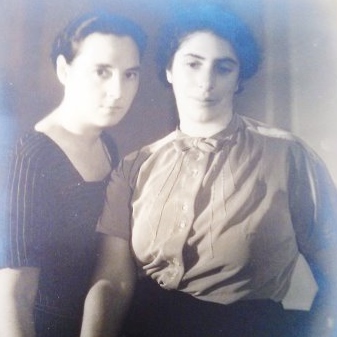click to dowload our latest edition
CLICK HERE TO SUBSCRIBE TO OUR NEWSLETTER


Published
6 years agoon
By
adminMOIRA SCHNEIDER
So said Veronica Belling, delivering the Jacob Gitlin Memorial Lecture about the lives of South African Jewish women from the mid-19th century to 1945.
“Jewish women in South Africa, many of whom are today either unknown or forgotten, played crucial roles in fields as diverse as the early Indian struggle against discrimination, the fight for the recognition of the Afrikaans language, for Women’s Enfranchisement, in the struggle for human rights and democracy. They played leading roles in politics, literature, theatre and art,” she says.
Belling started the Jewish Studies Library at UCT and retired as head librarian after 31 years’ service at the end of 2012. This lecture was condensed from her doctoral thesis in Historical Studies completed in 2013.
Belling examines the lives of several Jewish women of the time and explains what she describes as their “undue prominence” in the early days. However, she adds, some of them followed a path prepared for them by lesser-known personalities.
She examines the various factors at play, ranging from the influence of the culture of origin to the role played by education and social conditions that enabled the women to pursue their causes or careers.
“How do they compare to their gentile counterparts? Was it simply limited numbers, within the ethnically divided white settler community that allowed their rise to prominence? Were they simply big fish in a small pond?” she asks.
Belling labels Ita Hersch the first female Jewish intellectual in the country. Arriving in Johannesburg from Lithuania in 1891, she “overcame the limitations on women’s education”, later teaching Hebrew in Doornfontein and contributing to the South African Hebrew press.
Belling singles out Tony Saphra, a German immigrant who in 1931 “virtually singlehandedly” founded the Union of Jewish Women, which included in its objectives social welfare work among the needy of all races.
“There can be no doubt that the availability of cheap domestic labour facilitated the development of South Africa’s strong female communal networks,” she comments.
In those early years, many women were forced to leave school at the end of grade eight to help support their families so that their brothers could study to become doctors and lawyers, she continues. One of these was Sarah Goldblatt, future literary executrix of Afrikaans national poet Cornelis Langenhoven.
“Sarah was forced to leave school in grade six to help in her father’s business, so that her brother could become an advocate. Yet undeterred… Sarah studied privately for a matric to become a teacher.
“Unable to get a job in Cape Town, she went to Oudtshoorn where she became the secretary of Langenhoven and dedicated herself to his mission to have Afrikaans declared an official language.”
In the cultural sphere, South African historian Karl Schoeman declared novelist Sarah Gertrude Millin and artist Irma Stern, to be the leaders in their fields prior to the Second World War. “Both initially enjoyed some notoriety for focusing on the non-white population,” says Belling.
On Stern she comments: “Although she was initially controversial in South Africa’s conservative racist society, both for her subject matter and for her expressionist style, her Jewish supporters had her paintings accepted into the National Gallery – and the rest is history.”
Before 1945, South African theatre was kept alive by several highly qualified and experienced women, the earliest of whom were Jewish, namely Muriel Alexander and Leontine Sagan.
In the political sphere, Belling notes that active opposition to racism was not the norm in the Jewish or white community at the time. So, how does one account for the exceptions and why were so many of them women?
“It is possible that women are by nature more inclined to be sensitive to racial discrimination than men, simply because they themselves were traditionally discriminated against and treated as second class citizens for centuries,” she posits.
“For their time, Sonja Schlesin and Ruth Schechter Alexander, were exceptional as most of the female political activists and politicians were born much later in the 20th century. The most prominent Jewish woman in the Women’s Enfranchisement Association of the Union in South Africa was Bertha Solomon who became one of the first female MPs.
“Bertha epitomises Jewish women’s advancement through formal education, where they excelled disproportionately to their numbers (as did Jewish men),” says Belling.
“When women were finally admitted to the Bar in 1923, she was one of the first women to qualify.”
Other activists Belling cites include Hilda Bernstein, Fanny Klenerman, Pauline Podbrey and Ruth First. Klenerman taught English to Africans for many years in the Industrial and Commercial Workers Union.
First became the first white woman to be imprisoned under the 90-day detention law in 1963.
Trade unionist Ray Alexander Simon established the Federation of South African Women, a broad-based interracial women’s organisation that was the first to give women of colour a platform.
Belling concludes: “For the driven Anglo-German women such as Muriel Alexander, Leontine Sagan and Irma Stern, it was the influence of their cultural roots, whether German or British. For Sagan and Alexander, it was also the early timing of their family’s migration that put them at the forefront of the development of theatre in South Africa.
“For Irma Stern and Sarah Gertrude Millin, it was also their fascination with South Africa’s racial diversity. Eastern European ideologies played a key role both for the Zionist and for the radical women.
“Education, whether in the universities or the political movements, played a key role in the lives of the political activists as well as that of the politicians. Add to this mix the availability of cheap domestic labour that freed women to pursue communal work, political activism, or a career in whichever field they chose.
“And finally, it was small numbers in the dominant white colonial society which reduced the competition and allowed talented and driven Jewish women to rise to the top of their chosen careers,” she states.
